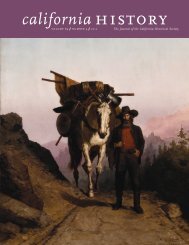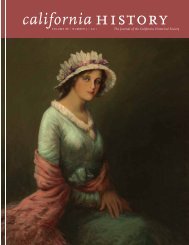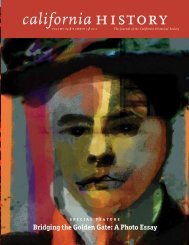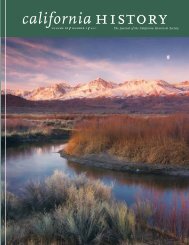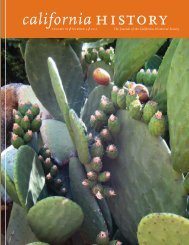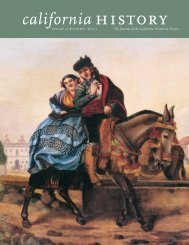california history - California Historical Society
california history - California Historical Society
california history - California Historical Society
Create successful ePaper yourself
Turn your PDF publications into a flip-book with our unique Google optimized e-Paper software.
Denovo, her autopsy revealed a downward trajectory,indicating that the police officer had firedfrom an upright position. Police Review CommissionerOsha Neumann and other critics questionedwhy, following Chancellor Tien and hiswife’s safe evacuation, there had been no negotiationsto persuade Denovo to surrender withoutincident. At the time of her death, Denovo carrieda handwritten note in her duffel bag vowing,“We’re ready to die for this land. Are you?” 64Ultimately, the university spent a million dollarsto build sand volleyball courts, though few communitymembers used them. In January 1997,the university removed the volleyball courts butmaintained a basketball court that also had beenbuilt in the early 1990s and was also a source ofcontroversy. Today, People’s Park remains a freepublic park from 6 a.m. to 10 p.m. serving primarilyas a daytime sanctuary for the homeless.The People’s Stage still hosts occasional ralliesand concerts on the park’s western end. 65On April 26, 2009, the stage became the focalpoint of the People’s Park fortieth anniversarycelebration. Two days earlier, Delacour,Schlesinger, Bardacke, and Van der Ryn hadspoken at a founders forum. Five years earlier,on the eve of the park’s thirty-fifth anniversary,Schlesinger had revealed a new account ofthe park’s founding: the original impetus hadbeen Delacour’s desire for a site to host theirromantic rendezvous. Delacour, who previouslyhad insisted that his motive was a desire for “afree speech area that wasn’t really controlledlike Sproul Plaza,” did not deny his romanticinvolvement with Schlesinger. However, herefuted Schlesinger’s explanation, adding simplythat other, more overtly political issues wereinvolved. 66Judy Gumbo Albert, Stew Albert’s widow and afellow activist, also attended the anniversary celebration.She described Delacour as “one of theunofficial keepers of the park’s flame.” Supportersof People’s Park, nevertheless, must wonderabout its future after Delacour and the originalfounders are gone. Already, the university warnsincoming freshmen of the park’s dangers, indoctrinatinga younger and more conservative generationwith a negative view of People’s Park. Yet,in an April 2000 referendum, students voted infavor of maintaining the park as it is, rather thanturning to an alternative use of the land, such asadditional housing. 67Is the university now just waiting for a futuretakeover, biding time until it can convincestudents of the park’s evils? Or will studentscontinue to resist the university’s efforts andsupport the park? Devin Wooldrige, communityrelations site coordinator of People’s Park for thelast nine years, believes that such distrust of theuniversity is simply misplaced: “The Universitypumps quite a bit of money into the park and Idon’t believe the park is now, or will be, in dangerof being redeveloped.” If Wooldrige is correct,People’s Park will always stand as a symbol ofgrassroots democracy. 68In her article on the park’s fortieth anniversarycelebration, Judy Gumbo Albert compared thepark then and now: “Maybe 50% hippies andfreaks, and the other 50% just plain folks: men,women, children, neatly dressed students, Vietnamvets, homeless women and men, bellydancers, bongo drummers, black, white andmulti-ethnic, one crowd, together, happy underthe warm <strong>California</strong> sun. Sitting on remarkablywell-tended and clipped grass, with the unmistakablesweet odor of that other grass thick in theair. Just like I remember.” 69Jon David Cash is the author of Before They Were Cardinals:Major League Baseball in Nineteenth-Century St. Louis (Universityof Missouri Press, 2002), a 2003 finalist for the SeymourMedal, awarded annually by the <strong>Society</strong> for AmericanBaseball Research (SABR) to the best book of baseball <strong>history</strong>or biography. He holds a PhD in American <strong>history</strong> from theUniversity of Oregon and currently lives in his hometown ofCrossett, Arkansas.9



